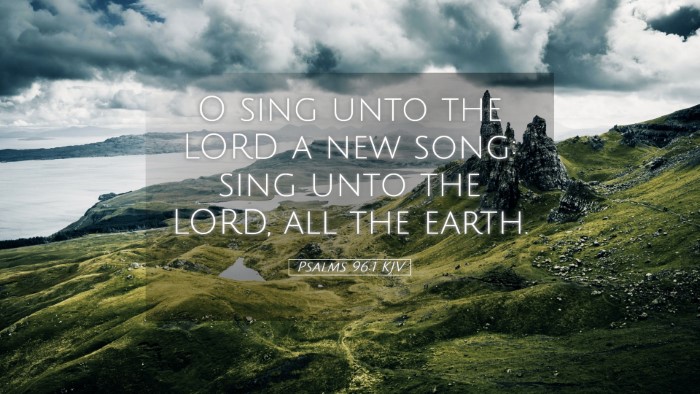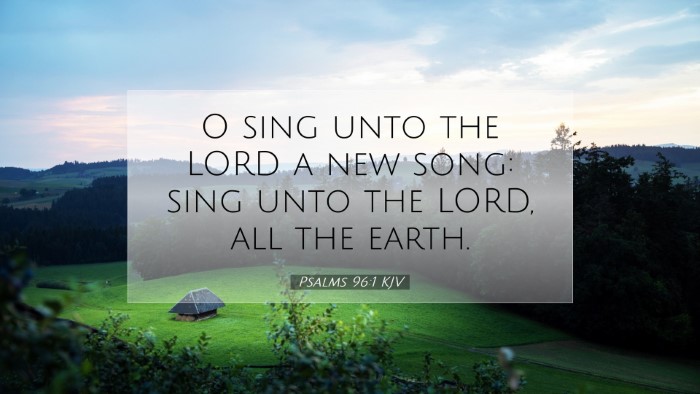Commentary on Psalms 96:1
Psalms 96:1: "O sing unto the Lord a new song: sing unto the Lord, all the earth."
Introduction
This verse is a powerful call to worship, celebrating God’s majesty and the imperative to spread His glory through song. The beauty of this psalm is found in its invitation not only to Israel but to all the earth to recognize and respond to God’s sovereignty and grace. Various public domain commentaries reveal rich insights into this canonical text.
Call to Worship
Matthew Henry’s Commentary: Henry emphasizes the universal scope of the call in this verse. He notes that singing a "new song" signifies the freshness of God's mercies and the continual inspiration believers find in their relationship with Him. It reflects a response to God’s new acts of deliverance and grace, suggesting that worship is a dynamic expression rather than a static routine.
Albert Barnes’ Notes: Barnes elaborates on the idea of a “new song,” representing joyous thanksgiving for new blessings and mercies. He points out that this expression should be from the heart, animated by the vitality of God’s spirit. He also highlights the collective nature of this command — "all the earth," indicating that worship should unite all peoples in recognition of God's greatness.
The Significance of Singing
Adam Clarke’s Commentary: Clarke stresses the importance of music in worship throughout the Scriptures. He states that singing is a natural expression of joy and gratitude. In this context, “singing a new song” serves as an acknowledgment of the constant renewal and faithfulness of God to His creation. Song is a profound way to echo the sentiments of the soul, enabling believers to connect with the divine through music.
Furthermore, Clarke reminds us that music has the power to lift spirits and promote unity, making it a vital component of corporate worship. This perspective underscores the call to engage all of creation — “all the earth” — in worship as an affirmation of God’s universal lordship.
The Universal Nature of Worship
Henry Expounds on Universality: The phrase “all the earth” is crucial as it emphasizes that God’s glory is not confined to Israel or any singular group, but is to be acknowledged by all nations. This reinforces the missionary nature of the psalm, as God's name must be proclaimed across the continents. It suggests a fulfillment of God’s promise that His salvation and glory would reach to the ends of the earth (Isaiah 49:6).
Barnes Comments on the Nations’ Response: Every nation on earth bears the obligation to recognize God’s majesty and respond in worship. He encourages the understanding that God’s reign deserves recognition beyond geographical or cultural boundaries. The call to “sing unto the Lord” is an acknowledgement of His exclusive worthiness of praise.
Theological Implications
The Revelatory Nature of Singing: The act of singing in worship is more than a ritual; it is a form of theology reflected in practice. Worship through song heralds the truths about God’s character, salvation, and the future promise of His kingdom. As noted by Henry, singing helps to articulate doctrinal truths and instill them into the worshiper's heart.
Singing a New Song: Clarke emphasizes that each new experience of God’s grace provides grounds for a new song. As believers journey through life, each new act of God’s faithfulness inspires a fresh response in worship. This sets the stage for understanding worship as an evolving experience that must be embraced with anticipation of God’s continuous revelation.
Practical Applications
- Encouragement in Worship: Pastors are encouraged to remind congregations that worship sung from the heart can serve as a powerful instrument of faith and testimony.
- Inclusive Worship: The universal call to worship invites leaders to create environments where people from all backgrounds feel welcomed to express their love for God.
- Creativity in Worship: Engaging the idea of a "new song," leaders can inspire creativity and innovation in worship, encouraging new expressions that reflect God’s work in contemporary life.
- Doctrinal Formation: Choirs and music ministry leaders can focus on teaching the theological richness embedded not only in hymns but also in contemporary songs.
Conclusion
The message of Psalm 96:1 serves as a reminder of the centrality of worship in the life of every believer. The call to sing a “new song” is a clarion call for renewal and joy in the worship experience, grounded in the ever-expanding revelation of God’s goodness. As believers today engage with this text, they are invited not only to respond in song but to witness to the world of the God who reigns over all.


